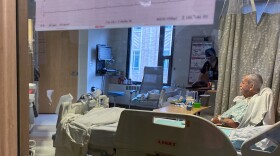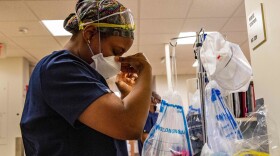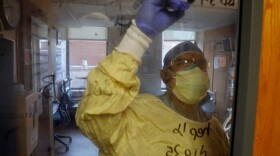
Will Stone
Will Stone is a former reporter at KUNR Public Radio.
-
When cancer survivor Katie Ripley got pneumonia, the 25-bed hospital in her small town didn't have the specialized care she needed. But with omicron surging, there was no ICU bed to transfer her to.
-
Slammed by COVID-19, many U.S. hospitals have put off essential procedures. Delays are leading to consequences like heart attacks and sending people to emergency rooms to get care.
-
People who get infected with omicron are less likely to go to the hospital, go on a ventilator or die. But with the current huge volume of patients, hospitals are still struggling to treat them all.
-
This latest coronavirus surge has set back a return to "normal." COVID is never going away -– and that has implications for hospitals, schools and public health officials.
-
Omicron may cause milder disease, but the sheer number of patients makes this wave far worse for the health care system. With packed emergency rooms, patients can wait days to get moved to a bed.
-
There are more patients and, in some places, not enough health care workers to go around. Research shows the crowding will impact care and increase mortality for all patients.
-
Researchers are looking at data from U.S. cases to determine if the variant causes milder disease. Even if the answer is yes, they say, rates of hospitalization could be high during the surge.
-
The burning questions: What makes this newly identified variant so transmissible? And what does it mean for preventing spread?
-
Understaffed hospitals are already coping with increased patient demand heading into the holidays. They have few options to expand if omicron creates a huge new wave of COVID patients.
-
Scientists are scouring coronavirus samples for clues of the omicron variant. The U.S. is in a better position now than it was earlier to find the variant, but some part of the country may struggle.









